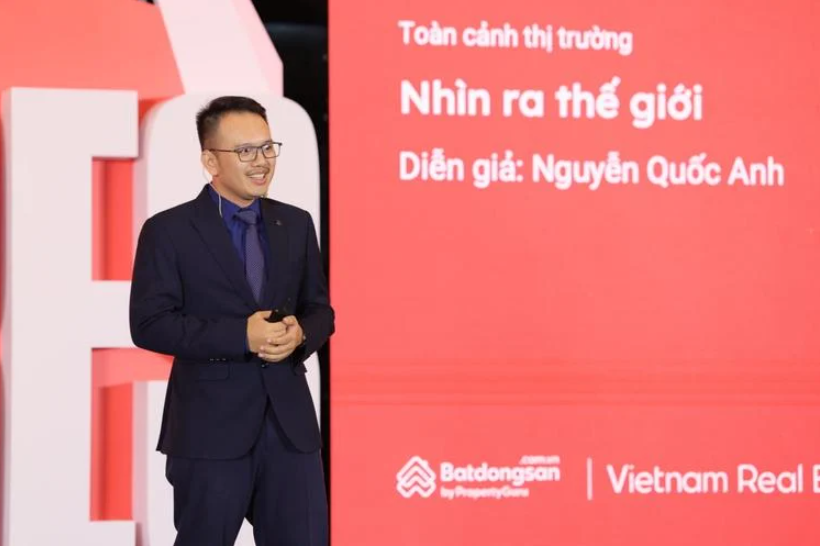
That is the opinion of Mr. Nguyen Quoc Anh, Deputy General Director of Batdongsan.com.vn at the Vietnam Real Estate Conference – VRES 2024. Besides, along with the attraction of real estate investment channel, the fact that real estate prices are constantly increasing makes it increasingly difficult for young Vietnamese people to buy a house.
The Attraction of Real Estate Investment
According to data from Batdongsan.com.vn, with the amount of money saved, Vietnamese people have a number of main investment channels such as financial markets, real estate, gold, foreign currency and savings. While the gold investment channel is volatile, risky and has a large gap between domestic and world gold prices, foreign currency and savings channels have quite low yields, in the range of 9 – 13% / 2 years, real estate is considered the investment channel with the best yield in Vietnam in the past 10 years with the profit margin of the apartment type reaching 197% and land reaching 137% in the fourth quarter of 2024 compared to the first quarter of 2015.

Mr. Nguyen Quoc Anh assessed that Vietnam is a country with a strong economic growth rate per capita and inflation. At the same time, the interest rate environment and investment efficiency of domestic channels both strengthen consumers’ demand for real estate. Real estate prices in Vietnam also grow among the top in the world, making this segment more attractive to buyers and investors.
Specifically, the growth in real estate prices in Vietnam in the 5 years (from 2019 to 2024) reached 59%, higher than many other countries such as the US (54%), Australia (49%), Japan (41%), Singapore (37%)… The high price increase makes the real estate rental yield in Vietnam only at 4%, while many other countries such as the Philippines, Malaysia, Thailand, Indonesia, UK, Australia, US have real estate rental yields ranging from 5% – 7%.
Notably, Vietnam is in the top countries with the highest real estate ownership rate in the world at 90%, higher than some countries in the Southeast Asian region such as Singapore (88%), Indonesia (84%) and higher than the US (66%), Australia (66%)… Vietnamese people have high expectations about owning real estate for common reasons including high and stable yields, underdeveloped financial markets, recognition from society and property – a place to live for the family.
Young People Are Having More and More Difficulty Buying a Home
According to the Deputy General Director of Batdongsan.com.vn, young Vietnamese people in any era have difficulty buying a house when real estate prices are constantly rising. Comparing the average salary and house prices of the past and present, it can be seen that not only Gen Z today but also young Vietnamese people, regardless of the era, have many difficulties in buying a house.
In 2004, it took an individual of the 7x generation about 31.3 years of income to buy an apartment (60m2) worth 0.6 billion VND, with an interest rate of 7.4%. After 10 years, the number of years of income for an individual of the 8x generation to buy the above apartment was 22.7 years. The apartment price has increased to 1.5 billion VND while the interest rate has decreased to 6%. By 2024, an individual of the 9x generation will need 25.8 years of income to buy the above apartment (worth 3 billion VND) with an interest rate of 4.5%. Although the number of years of income and interest rates have decreased over time, in general, young people of all generations still need to make a long effort to be able to own a house.
The continuous increase in real estate prices has made 2024 a year of great concern for issues related to selling prices and difficulties in owning real estate. The Deputy General Director of Batdongsan.com.vn commented that economics, management and society are the three main factors affecting real estate prices. In terms of economy, Vietnam is a country with a high per capita economic growth rate and strong inflation. At the same time, the interest rate environment and investment efficiency of domestic channels have all strengthened consumers’ demand for real estate.
Specifically, Vietnam’s GDP per capita growth is currently at 34.8%, higher than the world average (20.8%) and developing countries (22%). On the other hand, inflation in Vietnam is also higher than the average of other countries. Currently, the interest rate environment in Vietnam is gradually returning to a more favorable level and the proportion of accumulated assets in Vietnam’s GDP is quite high (32.8%), ranking 27th in the world (average 27.1%).
The second factor is management with tax as both a source of revenue and a tool for market management. Data from the Organization for Economic Cooperation and Development (OECD) shows that the proportion of real estate tax in GDP by country in Vietnam is at (0.03%), much lower than other countries such as China, Singapore (1.5%), Japan (2.6%), and South Korea (4%).
Finally, there are social factors. Vietnam’s population and urbanization rate present many opportunities for real estate demand growth. The trend of smaller families also drives demand for property for the next generation to inherit and the journey of home ownership for young people. In addition, culturally, Vietnamese people have a strong desire to own real estate in their lifetime.
According to Mr. Quoc Anh, in the face of rising real estate prices, referring to some prominent countries in the world, it can be seen that Real Estate Tax is used as a policy to manage the market and optimize revenue. However, before applying, many theoretical and operational challenges need to be considered appropriately. The perspective for Vietnam lies in the existence of many challenges from theory to appropriate application of real estate tax.

